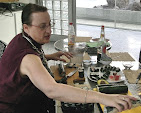Ahah! I thought I had posted this recipe on my blog ages ago, and it was only when this recipe appeared on a recent episode Tasting History and I did a search for my version to compare that I realised that I had drafted this but not posted it. Oops! I will have to cook these again so I can add some photos to this post.
So anyway, this one of the most delicious dishes in my repertoire. The combination of the sweetness of the dates and currants, with lamb mince and the beef broth is just divine. It is also a really useful dish for catering feasts with because you can get easy portion control (eg. 3 meatballs per person) and the meatballs can be prepped beforehand and then just cooked up in broth on the day.
The recipe I am giving is quite a large serving - if you are serving it as an entree, or for a smaller dinner, feel free to halve the recipe.
The Good Huswive's Handmaid for Cookerie (1588) Handmaide for the Kitchin
How to make Fartes of Portingale*.
Take a peece of a leg of Mutton, mince it smal and season it with
cloues, Mace pepper and salt, and Dates minced with currans: then roll
it into round rolles, and so into little balles, and so boyle them in a
little beefe broth and so serue them foorth.
Translation: Take a piece of a leg of mutton, mince it small and season it with cloves, mace, pepper an salt and dates minced with currants: then roll it into round rolls and then into little balls. and so boil them in a little beef broth and so serve them forth.
Recipe
30 grams of dates (buy pitted ones, it is worth it!)
1 kg lamb mince (if you can find mutton, use it, and let me know where I can get my hands on some of it!!!)
1/2 tsp ground cloves
1.4 tsp mace
salt
pepper
30 grams currants
3 litres of beef stock
Chop the dates finely - this is by far the most tedious part of the recipe - having some hot water on hand to wipe the knife down occasionally will help. I am told that the best method is to actually use a slicing rather than a chopping motion to cut up dates. Mince up the currants as well. Mix together with the meat and spices, and then form into small balls (you will get about 25-30). Bring your beef stock up to the boil, and add the meatballs. Cook until done - this will only take about 15 minutes. Serve piping hot in the broth.
*Portingale was the Elizabethan way of saying Portugal. Fartes are essentially cooked balls of food - most often meatballs, sometimes dough.



